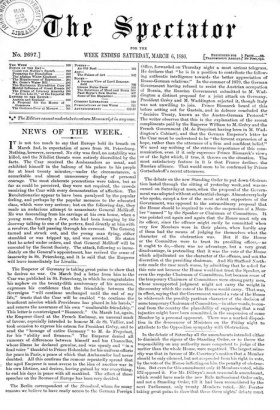In the debate of Saturday all the amendments intended either
to diminish the rigour of the Standing Order, or to throw the responsibility on any authority more competent to judge of the matter than the whole House, were negatived. The largest mino- rity was that in favour of Mr. Courtney's motion that a Member should be only silenced, but not suspended from his right to vote, by the vote of the House inflicting on him the penalty of obstruc- tion. But even for this amendment only 42 Members voted, while 172 opposed it. For Mr. Dillwyn's most reasonable amendment, which would have made the new Rule OrSessioual Order only, and not a Standing Order, till it had been reconsidered by the next Parliament, only twenty Members voted,—Mr. Forster taking great pains to show that these three nights' debate must be regarded as expressing a well-considered and mature con- 7,-iction of the House of Commons. In short, the Government carried everything before them, and a new Standing Order, which appears to us to be quite too lenient where it strikes justly, but to be quite unguarded by any security that, in case of discussions in Committee, it shall not strike very un- justly, was the result.



































